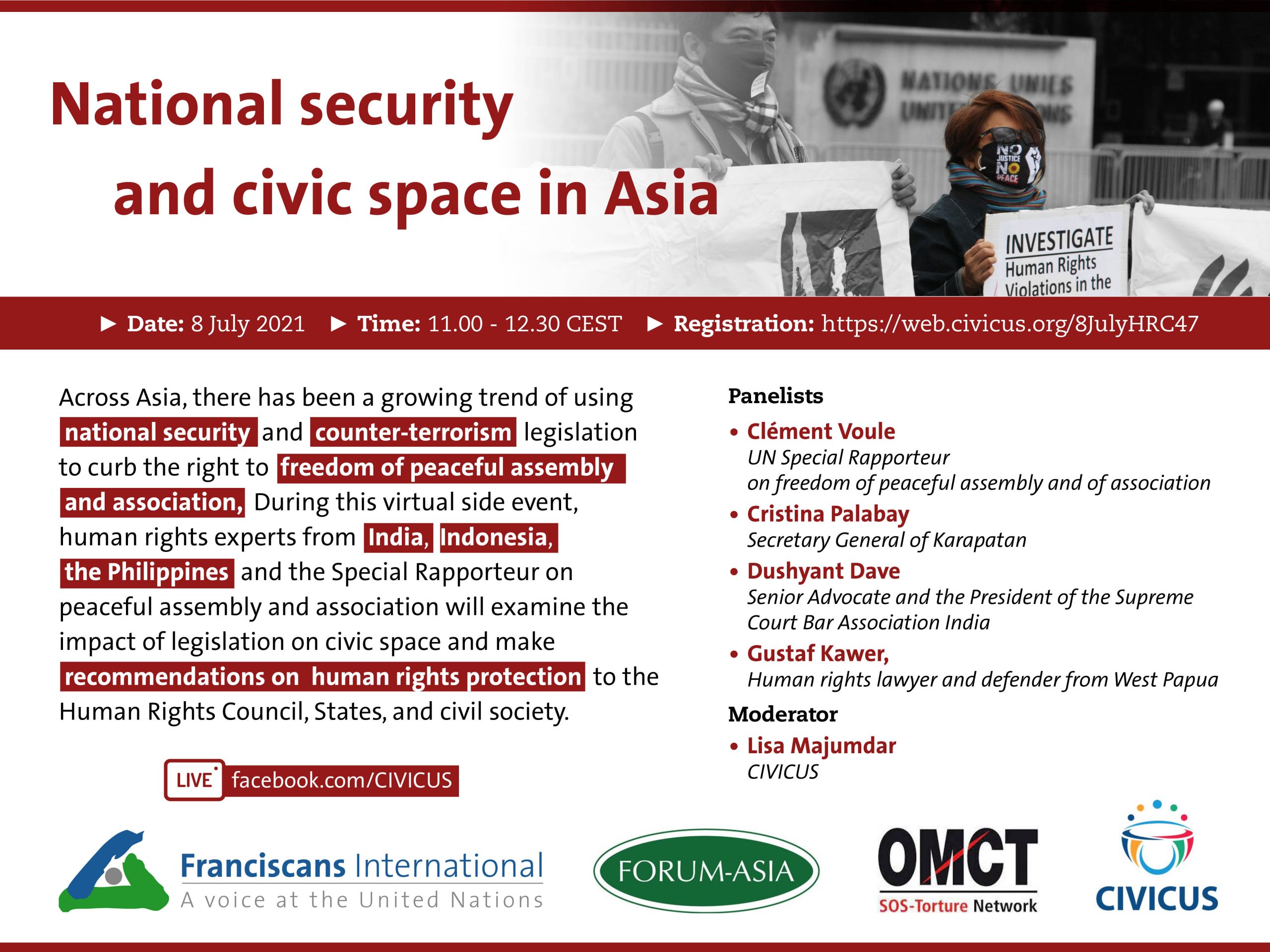Date: Thursday, 8 July 2021
Time: 11.00 – 12:30 AM (CEST) / 4.00 – 5.30 PM (ICT)
Venue: Zoom / Facebook Live via CIVICUS
Registration: https://web.civicus.org/8JulyHRC47
***
In a report to the UN Human Rights Council in June 2018, the Special Rapporteur on the rights to freedom of peaceful assembly and of association identified the increasing use of legislation, in particular national security and counter-terrorism legislation as one of the growing trends that have contributed to the limitation of the right to freedom of peaceful assembly and of association globally.[1] Three years after the report, the situation has been a proliferation of national security and counter-terrorism laws across Asia, at the expense of fundamental human rights. In several Asian countries, previously guaranteed constitutional and legal protections for freedom of assembly and of association have been completely abrogated or severely curtailed with vague laws and regulations that purportedly protect national security or counter-terrorism. In most of these countries, these laws have been disproportionately used to silence the legitimate work of human rights defenders and civil society organisations and criminalise peaceful human rights advocacy.
In India, a broad range of national security and counter-terrorism laws have been used to arbitrarily to detain, criminalise and impose travel restrictions on human rights defenders and journalists, shutdown internet, and restrict access to resources by civil society organisations.
In the Philippines, the recently adopted Anti-Terrorism Act erodes fundamental freedoms and remove necessary checks and balances with serious threats to civic space, in particular the rights to freedom of expression, assembly and association. Vague provisions in the law solidify the abuse of state power against human rights defenders and civil society. Such powers in the hand of an abusive government such as that of the Philippines which has systematically used terrorist tagging to silence human rights defenders and activists with fatal consequences sound the death knell for civil society.
Heavy militarisation of Papua by Indonesian authorities in the name of national security and counterterrorism continue to fuel violence and restrict the rights to freedom of expression, assembly and association. Indonesia has deployed thousands of police and troops to the region supposedly to quell unrest resulting in violent crackdowns on protests. In an attempt to justify deployment of elite counter terrorism troops in Papua, Indonesian authorities have resorted to arbitrarily labeling of human rights defenders, political activists, journalists and civil society as terrorists, risking further escalations of violence.
In this context, this side-event aims to:
- Increase the visibility of the impact of national security and counterterrorism legislation on civic space in Asia, and call for appropriate international response;
- Make recommendations to the UN Human Rights Council, States and civil society on ensuring human rights protection, in particular rights to freedom of assembly and of association, in the context of national security and counterterrorism
Panelists:
- Clément Voule, UN Special Rapporteur on the rights to freedom of peaceful assembly and of association
- Cristina Palabay, Karapatan, Philippines
- Dushyant Dave, Senior Advocate and the President of the Supreme Court Bar Association, India
- Gustaf Kawer, human rights lawyer, and defender from West Papua
Moderator: Lisa Majumdar, CIVICUS
This is a UN side event at HRC47 organised by FORUM-ASIA, Franciscans International, CIVICUS: World Alliance for Citizen Participation and World Organisation Against Torture (OMCT).
[1] https://undocs.org/A/HRC/38/34
***
Media contact:
For more information or to set up an interview with any of the speakers, please contact Melissa Ananthraj, Communication and Media Programme Manager, FORUM-ASIA at [email protected]
About the organisations:
- The Asian Forum for Human Rights and Development (FORUM-ASIA) is a Bangkok-based regional network of 81 member organisations across 21 Asian countries, with consultative status with the United Nations Economic and Social Council, and consultative relationship with the ASEAN Intergovernmental Commission on Human Rights. Founded in 1991, FORUM-ASIA works to strengthen movements for human rights and sustainable development through research, advocacy, capacity-development and solidarity actions in Asia and beyond. It has sub-regional offices in Geneva, Jakarta, and Kathmandu. forum-asia.org
- Franciscans International is a non-profit, international non-governmental human rights organisation established in 1989. Its staff consists of professionals of diverse backgrounds working to translate grassroots voices in human rights advocacy action at the United Nations level. Franciscans International seeks to promote and protect human rights and environmental justice. franciscansinternational.org
- CIVICUS: World Alliance for Citizen Participation is a global alliance of civil society organisations and activists dedicated to strengthening citizen action and civil society throughout the world. The CIVICUS Monitor is a research tool that provides close to real-time data on the state of civil society and civic freedoms in 196 countries. The data is generated through a collaboration with more than 20 civil society research partners. www.civicus.org/
- World Organisation Against Torture (OMCT) works with 200 member organisations to end torture and ill-treatment, assist victims, and protect human rights defenders at risk wherever they are. Together, OMCT makes up the largest global group actively standing up to torture in over 90 countries. We work to protect the most vulnerable members of our societies, including women, children, indigenous peoples, migrants and other marginalized communities. To achieve this, they advocate with governments to change or implement their laws and policies, we help victims seek justice and strive to hold perpetrators to account. Because torture can never be tolerated, and human dignity is not negotiable. omct.org





